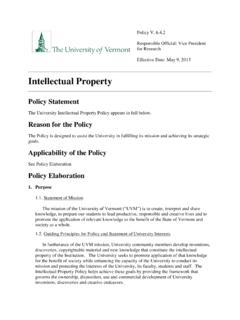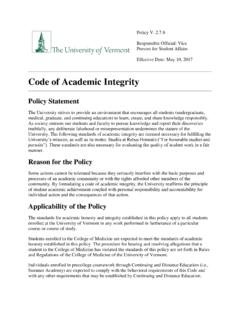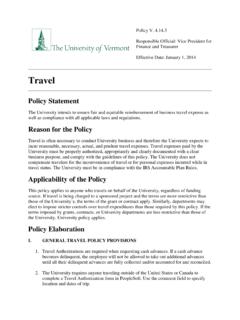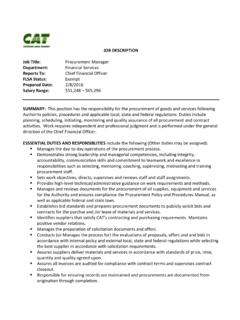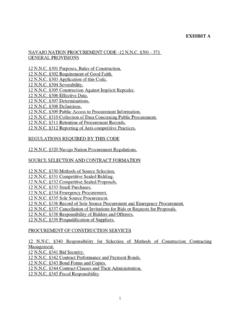Transcription of Contract Approval and Signatory Authority
1 Policy V. Responsible Official: General Counsel Effective Date: July 26, 2016 Contract Approval and Signatory Authority Policy Statement Individuals have the Authority to enter into negotiations, approve and/or sign contracts on behalf of the University only pursuant to (1) a resolution of the Board; (2) a valid delegation of Authority from the President or the University Board of Trustees ( Board of Trustees ); or (3) a purchase made in accordance with the University Procurement or Lease of Goods and Services and Contract Approval and Signatory Authority for Procurement or Lease of Goods and Services policy. Reason for the Policy This Policy is intended to ensure that any commitment of University resources and all related agreements obligating the University are properly reviewed and approved. This Policy describes necessary steps in the Contract review process and identifies the individuals who are authorized to commit institutional resources on behalf of the University through agreements executed in its name.
2 It also contains protocols for the delegation of Signatory Authority . Applicability of the Policy This Policy applies to University administrators, faculty, staff and students, and to agents of the University. It governs contractual agreements relating to commercial and non-commercial transactions. Policy Elaboration 1. Types of Contracts. a. Procurement or Lease of Goods and Services. The requirements that apply to contracts for procurement, or lease, of goods and services are set forth in the policy entitled Procurement or Lease of Goods and Services and Contract Approval and Signatory Authority for Procurement or Lease of Goods and Services . ( ). All University personnel are required to abide by Purchasing Services requirements and review process when requisitioning goods and services. Contract Approval and Signatory Authority Page 2 of 7 b. All other contracts. Responsibility for obtaining Approval and securing an authorized signature of all other contracts ( , contracts that do not involve the procurement or lease of goods and services) rests with the senior-most University official responsible for the activity that is the subject of the Contract ( the responsible official ).
3 2. Required Approvals a. Board of Trustees. Certain matters require the Approval of the Board of Trustees ( Board of Trustees or Board ), pursuant to the Board Resolution Regarding Delegation and Retention of Authority ( ). Matters requiring Approval include (but are not limited to): Employment severance payments in excess of the standard amount that University policy specifies for officials who report to the President; The establishment of faculty clinical practice plans; The naming of, and name removal from, academic units, buildings and academic programs; The purchase, sale, exchange, or transfer of complete or partial interests in real property valued greater than $1,000,000, provided that the administration shall report at least once annually on transfer of such interests at a value of greater than $500,000 and less than or equal to $1,000,000; The lease or sublease of property with annual or aggregate rental value that equals or exceeds $500,000, and renewal thereof.
4 Payments in lieu of taxes to a governmental entity or payment of fees for municipal services rendered by or through a government entity and, in either instance, voluntarily; The program design of a capital project and authorization to proceed with a capital project at an aggregate cost of greater than $2,000,000, at a specified not-to-exceed cost, including increases in project costs for previously approved projects whose value in aggregate equals or exceeds $1,000,000, provided that the administration shall report to the Board on capital projects with an aggregate cost of greater than $1,000,000 and less than or equal to $2,000,000 as plans are developed and before the projects are initiated; A Contract with a vendor for purchase of goods or equipment or the procurement of services, at an aggregate cost of greater than $1,000,000, when such costs were Contract Approval and Signatory Authority Page 3 of 7 not authorized previously through the customary capital projects Approval process; A Contract with a vendor for professional services at an aggregate cost if greater than $250,000 when such costs were not authorized previously through the customary capital projects Approval process, and if the type of contact is not otherwise addressed in the Board s reserved rights resolution; Revenue-generating contracts for services provided, or goods or equipment generated, by a unit or program of the University at a cost to the contractee of more than $1,000,000 over the term of Contract .
5 Contracts or leases whose term, including potential or renewals, exceeds five years, regardless of Contract value or amount, provided that Board Approval is not required for licenses and option agreements, confidentiality agreements, material transfer agreements, or other similar arrangements administered by the University Office of Technology Commercialization; The material terms of collective bargaining agreements and, within the context of annual budget preparation and Approval , the annual salary pool for non- union-represented employees; and The settlement of lawsuits at a cost that equals or exceeds $250,000, regardless of insurance coverage, and authorization to file or settle lawsuits in which the Board, a Trustee or a University officer is a named party or a Board-approved policy is in dispute If a Contract requires Board of Trustees Approval , the responsible official must be the President or a Vice President and, if the latter, the Vice President must obtain the Approval of the President before a Contract is submitted to the Board for action.
6 When initiating a Contract that requires Board of Trustees Approval , the responsible official must allow ample time in the process to meet the Board materials submission deadlines; information regarding those deadlines may be obtained from the Office of the Board Coordinator [Trustees Coordinator (802) 656-7898]. b. Authorized Officials. An official becomes authorized to enter into negotiations and/or approve or sign contracts on behalf of the University only pursuant to (1) a resolution of the Board; or (2) a valid delegation of Authority from the President or other Board-authorized official. Any further delegations must occur pursuant to the delegation of Authority protocol (see 4(f) below). 3. Required Reviews for all non-Procurement related contracts. The responsible official must ensure that, before submitting a Contract for action by the President and/or Board of Trustees, the proposed Contract undergo the following reviews: Contract Approval and Signatory Authority Page 4 of 7 a.
7 Risk Management. The responsible official must consult with Risk Management when the subject matter or language of a Contract (a) raises issues of liability, including a risk of accidental injury to the University s employees, students, or invitees, or damage to property owned, leased, or loaned by or to the University; (b) contains Contract provisions relating to insurance; waivers of rights including subrogation; additional insured status; liability limitations or waivers; or defense, hold harmless, and/or indemnification obligations; (c) seeks to select the choice of law, forum, or dispute resolution means; or (d)raises issues of cyber risk which could expose UVM to security and/or privacy violations. b. Office of the General Counsel. The responsible official must consult with the General Counsel or her/his designee ( the General Counsel ) when a Contract or commitment requires Board Approval under the Board Resolution Regarding Delegation and Retention of Authority cited above.
8 The responsible official must also consult with the General Counsel as to proposed settlement agreements as to disputed claims, whether formally ( , in courts or agency proceedings) or informally asserted. It is otherwise within the discretion of the responsible official to determine whether to consult with the General Counsel, provided that consultation is strongly recommended as to the following matters: affiliation agreements with other organizations, institutions, corporations or entities; contracts containing obligations in aggregate exceeding $ 250,000, and/or financial exposure exceeding $250,000; employment agreements with officers of administration c. Enterprise Technology Services. The responsible official must consult with the Chief Information Officer in UVM s Enterprise Technology Services when the subject matter or language of the Contract raises (a) issues of Information Security and Privacy and potential for compromises of information entrusted to UVM s care; or (b) implications for ongoing commitments of institutional resources for network or systems support.
9 4. Additional General Principles and Rules a. Conflicts of Interest. It is the responsibility of all University officials to ensure that the University does not knowingly enter into contracts that present conflicts of interest. Responsible officials must accordingly exercise their Authority in a manner consistent with applicable conflict of interest policies. If a conflict arises for a responsible official, he or she must disclose the conflict promptly to his/her supervisor before entering into Contract negotiations or Contract review and excuse himself/herself from any involvement in the Contract negotiations or review. In such cases, the supervisor shall assume responsibility for the Contract or arrange for the appointment of a substitute responsible official. Questions regarding interpretation of University conflict of interest policies may be directed to the General Counsel. Contract Approval and Signatory Authority Page 5 of 7 b.
10 Unauthorized commitments or agreements. Individuals who enter into commitments or agreements without the requisite Authority may be personally liable for the obligations assumed under such agreements. University administrators, faculty, staff or students who enter into unauthorized agreements may also be subject to disciplinary action, up to and including dismissal. c. Tax Obligations. Revenue-generating contracts may give rise to University tax payment obligations. All such agreements must be reviewed and approved by the Vice President for Finance and Treasurer or his/her designee. d. Requirement of a Written Agreement. Oral agreements are not authorized regardless of whether there is a monetary exchange. e. Securing all Necessary Signatures. The Authority to approve the commitment of financial or other University resources may be vested in more than one University official. In such cases, all necessary officials must sign the Contract .


